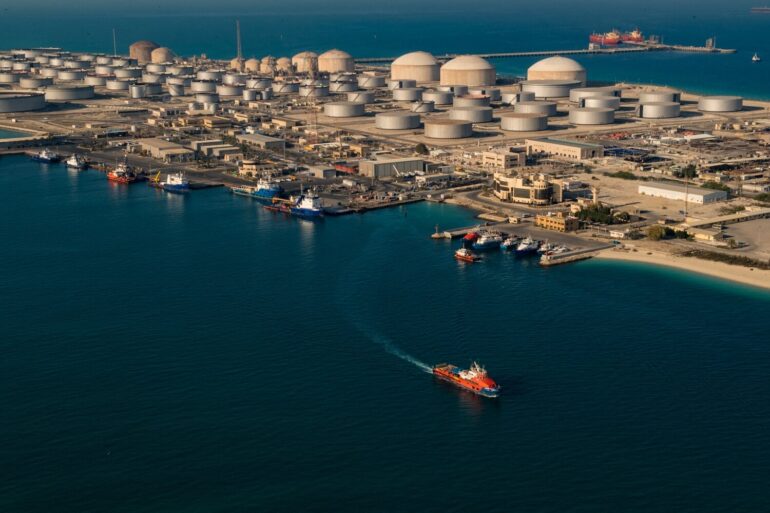- Saudi Aramco share price halts crude sales to Russia-backed Nayara Energy. Explore the impact on India’s refining sector,
Saudi Aramco has once again become the center of market attention this weekend, not because of oil prices, but due to a supply decision that continues to shape India’s refining landscape. The world’s largest oil exporter, along with Iraq’s SOMO, halted crude oil sales to Russia-backed Indian refiner Nayara Energy following European Union sanctions imposed in July on Russian-linked entities.
Fresh data shows Nayara has since ramped up crude processing at its Vadinar refinery to 90–93% of capacity, recovering from 70–80% earlier this year. Before sanctions, the refiner’s 400,000-barrel-per-day facility ran at full tilt, 104% utilization, receiving roughly 3 million barrels a month from Saudi and Iraqi suppliers.
With those flows frozen, Nayara has relied heavily on Russian barrels to maintain operations, underscoring India’s growing dependence on discounted Moscow crude. The development has driven a surge in search interest for Aramco share price, now trending across Indian financial platforms as traders assess how shifting energy diplomacy could influence Aramco’s long-term valuation.
Aramco Share Price Reflects Investor Curiosity Amid Shifting Energy Flows
Investor focus on Aramco stock has intensified since news of the suspension broke. In Riyadh, the Aramco share price remains steady near SAR 32–33, with investors viewing the move as a calculated response to regulatory risk rather than a signal of weakening demand.
I beleive that the attention on Aramco’s valuation shows how investors now see the company as a barometer of geopolitical balance between the Gulf, Russia, and Asia. The company’s ongoing expansion in India’s refining and petrochemical sectors, particularly in Gujarat and Andhra Pradesh, could face temporary delays if supply restrictions to private refiners persist.
How the Aramco Supply Halt Impacts India’s Refining Sector
Nayara Energy represents around 8% of India’s total refining capacity, meaning any disruption in its crude inflows can ripple across domestic fuel balances. While the firm has restored operations to near full capacity, its reliance on Russian oil leaves it exposed to future sanctions or logistical hurdles.
Meanwhile, the ripple effect is already visible among other Indian refiners. Reliance Industries, previously Russia’s biggest crude customer in India, has reportedly paused purchases of Russian oil after fresh U.S. sanctions on Rosneft and Lukoil. In contrast, Indian Oil Corp has taken delivery of five December cargoes from non-sanctioned suppliers to maintain supply diversity and protect refining margins.
Analysts say the episode highlights how policy and compliance risks now weigh more heavily than price cycles in determining India’s supply stability. It also underscores the delicate balance between economic opportunity and diplomatic alignment in the global energy market.
Outlook: What’s Next for Aramco and India’s Energy Market
Heading into November, markets are watching whether Saudi Aramco resumes shipments to Indian refiners or shifts focus to more stable destinations. Any update would likely move Aramco’s share price immediately, given its deep ties to Asian demand and investor sentiment.
In my view, India’s next phase of energy resilience depends on broadening its sourcing network, adding the UAE, the U.S., and West Africa, to offset potential Gulf supply risks. For Aramco, the path forward will hinge on balancing commercial expansion with compliance discipline.
Both sides remain crucial to the evolving map of global oil diplomacy, where strategy increasingly outweighs speculation.
Saudi Aramco, and Arab Iraqi SOMO, allegedly ceased providing crude to Nayara Energy due to EU sanctions attributed to its Russian control-related issues with creating payment and shipping problems. Recent months have compelled Nayara to depend on Russian crude more.
The Aramco stock price is expected to remain on the side in the short term since investors will perceive the stoppage as a strategy to handle the risk and not a measure of declining demand. Crucial to the fact that with the oil prices staying above the 80 a barrel mark, the general attitude to Aramco is positive.
The suspension underlines the increased reliance of India on Russian oil at discounted rates, and the effect is a possible temporary disturbance of the diversity of the sourcing of crude. Nevertheless, the other refiners would not show any major changes in their operations and the energy analysts do not expect any significant long-term changes in the overall refining output of India.




